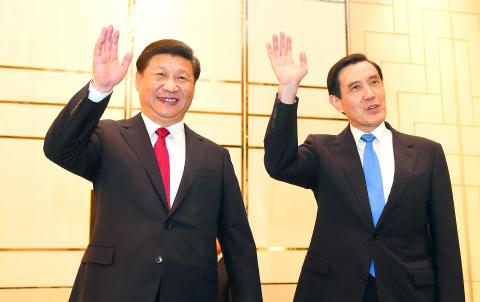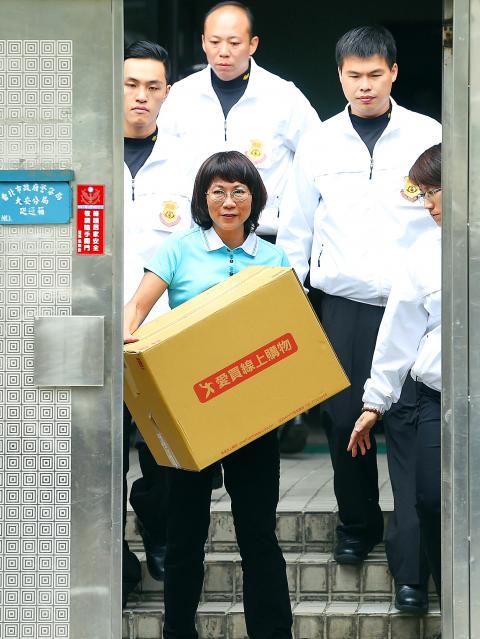November certainly wasn’t a quiet month on the election front, but for all the busy goings on Joey can’t help feeling none of it has added anything to the quality of the political debate. This must be the most vacuous election campaign in the history of the nation’s politics. More hot air has been expelled over the past few months than from an elephant’s rear end after an evening of curry and Taiwan Beer.
MA-XI MEETING
First there was the much-hyped meeting between President Ma Ying-jeou (馬英九) and Chinese president Xi Jinping (習近平), which predictably turned out to be a damp squib — how could it not? The leaders of the two countries meet at a hotel for a cup of tea and a half-hour chinwag. Big wow.

Photo: Liu Hsin-de
No agreement was reached and the only thing they managed to sign was the check for the bill at the end — they “went Dutch,” which, says Ma, proves they met on an equal footing.
The only newsworthy bit of the event was Ma’s antics afterwards, when, literally drunk on the success of his longed-for meeting, he appeared to tell reporters on the plane that he counts himself as one of Xi’s “officials.” As Joey always says, the truth will always out after a glass or two of champagne, or as I like to call it, French truth serum.
CHU GOES TO WASHINGTON

Photo: Chu Pei-hsiung
Chinese Nationalist Party (KMT) presidential candidate Eric Chu (朱立倫) made a nuisance of himself in Washington in the middle of last month. Like a distant cousin forcing himself on his extended family for a week, Joey suspects the Americans were glad to see the back of him. Nothing much reported in the media, since it was all done behind closed doors. However, Joey has heard Eric’s team succeeded in thoroughly annoying his hosts with a constant stream of questions about the previous visit by Democratic Progressive Party (DPP) presidential candidate Tsai Ing-wen (蔡英文) in June.
Chu: Was Tsai served prosecco instead of champagne at the reception too?”
US official: Oh yes Mr. Chu, US government cut-backs I’m afraid.
Chu: I see… And was Tsai also given these spam and cheese twizzler canapes? You are giving us exactly the same treatment as Tsai aren’t you?
US official: Ahem! …Mr. Chu, have you tried the pretzels? Here. And tell me, where did you get that tie you’re wearing? I just love the color!
On his return to Taiwan, Chu’s party was anxious to demonstrate that the US clearly favors the KMT as the preferred governing party of Taiwan. The party seized on a remark made by former American Institute in Taiwan chairman Richard Bush, who said the US valued cross-strait developments under Ma’s administration and would like to see these continue. At a press conference following his words, KMT legislators predictably tried to spin Bush’s remarks. See! That proves it, they crowed, the US clearly supports Chu!
POLL CONFUSION
Stop the press! On Nov. 26 there was a collective raising of eyebrows when the KMT released a wonderfully fortuitous opinion poll that showed 29.2 percent of respondents support the party, while the DPP received 39.7 percent, narrowing Tsai’s lead to a mere 10.5 percent. Now, some people have accused the KMT of “massaging” the figures, something for which Joey could not possibly comment. However, it was unfortunate that two days later, the United Daily News (UDN) came out with a poll that showed 19 percent support for the KMT and 46 percent support for the DPP, numbers that were corroborated by a Liberty Times (the Taipei Times’ sister newspaper) poll. Another slick piece of work from the KMT propaganda machine.
CHU picks a RUNNING MATE
Last month, Chu finally selected his running mate for the election, Jennifer Wang (王如玄). Problem. The staff at KMT HQ clearly didn’t do enough vetting. The brown stuff duly hit the fan as the media started to delve into Wang’s financial background. Following days of intense media speculation, Wang made public a list of assets and properties under her and her husband’s names: together they own four plots of land, seven buildings and possess NT$28.59 million in savings. Rumors persist over past speculative sales of military housing units.
This is all rather unfortunate, since Wang and her hubby, not exactly short for cash, rent a taxpayer-funded government dormitory, provided at a highly-subsidized rent — allegedly NT$2,000 per month. It gets worse: irony of ironies, Wang’s husband is director of the Judicial Yuan Department of Government Ethics. You couldn’t make this stuff up.
Following a public outcry, Wang and her husband moved out of the dormitory. Cue a ludicrous, stage-managed photograph of Wang moving out of her apartment. Wang was snapped exiting the dormitory’s front door holding, with surprising ease and at a 45-degree tilt, what appeared to be an empty box. Wang was flanked by at least three officious-looking male minders dressed in matching white jackets, carrying absolutely nothing. Either the notion of gentlemanly conduct in Taiwan has taken a battering in recent years, or the staffers at KMT HQ take the public to be a bunch of fools.
THE MEDIA CIRCUS CONTINUES
With only a month-and-a-half to go until the election, all these KMT self-inflicted wounds have had the effect of almost completely removing the pressure from Tsai and her team. And so another month rolls by, the media circus around Chu and chums continues, and the public is still none the wiser what a future DPP government would look like.
Even worse, it now looks as if we won’t even get a presidential debate due to a disagreement between the parties over which TV station should play host — a situation from which the DPP, far ahead in the polls, stands to benefit. Will we ever see proper scrutiny, with each candidate grilled like a kipper over their policies, before the election? Joey despairs.
Chopped Suey, a satirical column published on the first Monday of every month, will comment on issues related to the forthcoming presidential and legislative elections to be held on Jan. 16, 2016.

Most heroes are remembered for the battles they fought. Taiwan’s Black Bat Squadron is remembered for flying into Chinese airspace 838 times between 1953 and 1967, and for the 148 men whose sacrifice bought the intelligence that kept Taiwan secure. Two-thirds of the squadron died carrying out missions most people wouldn’t learn about for another 40 years. The squadron lost 15 aircraft and 148 crew members over those 14 years, making it the deadliest unit in Taiwan’s military history by casualty rate. They flew at night, often at low altitudes, straight into some of the most heavily defended airspace in Asia.

Taiwan’s democracy is at risk. Be very alarmed. This is not a drill. The current constitutional crisis progressed slowly, then suddenly. Political tensions, partisan hostility and emotions are all running high right when cool heads and calm negotiation are most needed. Oxford defines brinkmanship as: “The art or practice of pursuing a dangerous policy to the limits of safety before stopping, especially in politics.” It says the term comes from a quote from a 1956 Cold War interview with then-American Secretary of State John Foster Dulles, when he said: ‘The ability to get to the verge without getting into the war is

Beijing’s ironic, abusive tantrums aimed at Japan since Japanese Prime Minister Sanae Takaichi publicly stated that a Taiwan contingency would be an existential crisis for Japan, have revealed for all the world to see that the People’s Republic of China (PRC) lusts after Okinawa. We all owe Takaichi a debt of thanks for getting the PRC to make that public. The PRC and its netizens, taking their cue from the Chinese Communist Party (CCP), are presenting Okinawa by mirroring the claims about Taiwan. Official PRC propaganda organs began to wax lyrical about Okinawa’s “unsettled status” beginning last month. A Global

Like much in the world today, theater has experienced major disruptions over the six years since COVID-19. The pandemic, the war in Ukraine and social media have created a new normal of geopolitical and information uncertainty, and the performing arts are not immune to these effects. “Ten years ago people wanted to come to the theater to engage with important issues, but now the Internet allows them to engage with those issues powerfully and immediately,” said Faith Tan, programming director of the Esplanade in Singapore, speaking last week in Japan. “One reaction to unpredictability has been a renewed emphasis on